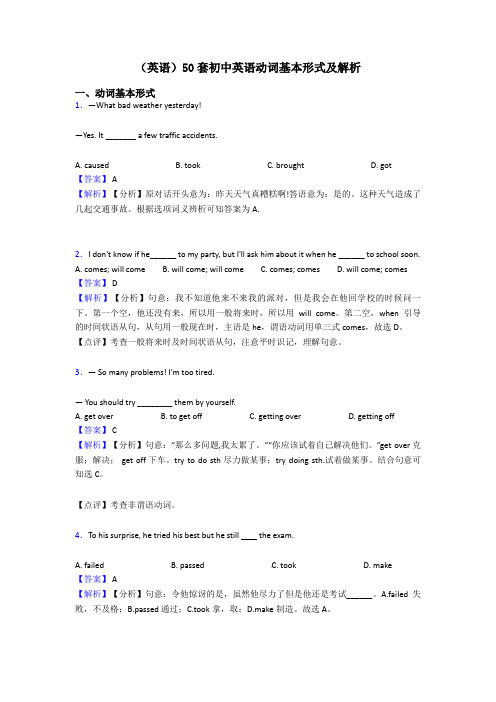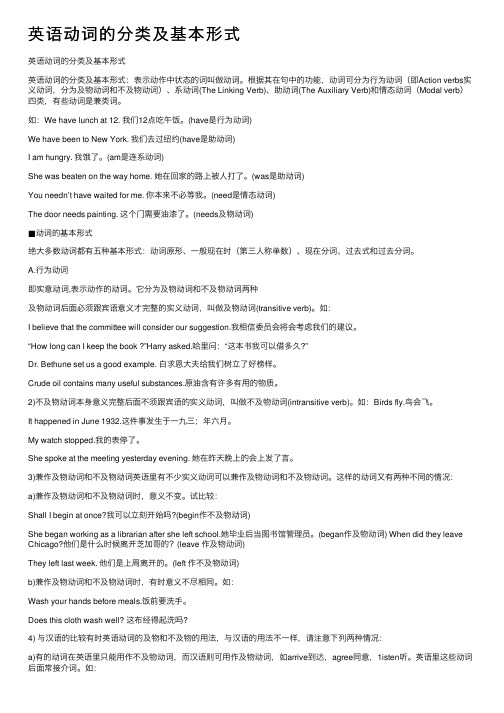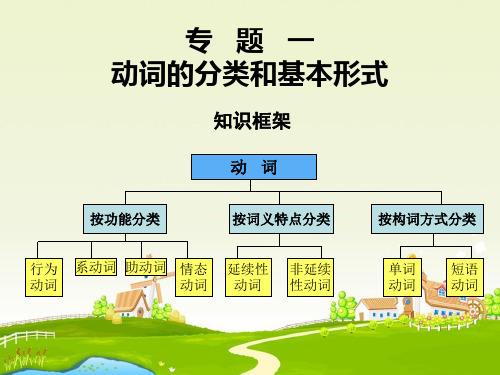(英语)50套初中英语动词基本形式
(完整版)初中英语不规则动词表(完整版)

初中英语不规则动词表(完整版)一. AAA型(原形→原形→原形)原形过去式过去分词汉语意思read read read读cut cut cut切,割let let let让put put put放cost cost cost花费,值hit hit hit撞,击set set set安排,安置hurt hurt hurt使…伤痛bet bet bet赌博,打赌cast cast cast抛二. ABA型(原形→过去式→原形)原形过去式过去分词汉语意思become became become成为come came come来run ran run跑throw threw thrown扔三. ABC型1. ow →ew →own原形过去式过去分词汉语意思blow blew blown吹draw drew drawn画grow grew grown生长know knew known 知道2. i→a →u原形过去式过去分词汉语意思begin began begun开始drink drank drunk喝sing sang sung唱swim swam swum游泳ring rang rung打电话3. 原形→过去式→过去式+(e)n原形过去式过去分词汉语意思wear wore worn穿forget forgot forgotten忘记speak spoke spoken说freeze froze frozen冻choose chose chosen选择drive drove driven驾驶mistake mistook mistaken误解rise rose risen上升shake shook shaken摇4. 原形→过去式→原形+(e)n。
(完整版)初中英语不规则动词表(完整版)

初中英语不规则动词表(完整版)一. AAA型(原形→原形→原形)原形过去式过去分词汉语意思read read read读cut cut cut切,割let let let让put put put放cost cost cost花费,值hit hit hit撞,击set set set安排,安置hurt hurt hurt使…伤痛bet bet bet赌博,打赌cast cast cast抛二. ABA型(原形→过去式→原形)原形过去式过去分词汉语意思become became become成为come came come来run ran run跑throw threw thrown扔三. ABC型1. ow →ew →own原形过去式过去分词汉语意思blow blew blown吹draw drew drawn画grow grew grown生长know knew known 知道2. i→a →u原形过去式过去分词汉语意思begin began begun开始drink drank drunk喝sing sang sung唱swim swam swum游泳ring rang rung打电话3. 原形→过去式→过去式+(e)n原形过去式过去分词汉语意思wear wore worn穿forget forgot forgotten忘记speak spoke spoken说freeze froze frozen冻choose chose chosen选择drive drove driven驾驶mistake mistook mistaken误解rise rose risen上升shake shook shaken摇4. 原形→过去式→原形+(e)n原形过去式过去分词汉语意思eat ate eaten吃forbid forbade forbidden禁止give gave given给ride rode ridden骑see saw seen看见write wrote written写fall fell fallen落下break broke broken打破,折断forgive forgave forgiven原谅;宽恕5. 无规律原形过去式过去分词汉语意思am/is was been是are were been是do did done做go went gone走take took taken拿四. ABB型1. 原形→ought →ought原形过去式过去分词汉语意思bring brought brought带来buy bought bought买fight fought fought打架think thought thought思考seek sought sought寻求2. 原形→aught →aught原形过去式过去分词汉语意思catch caught caught捉,抓teach taught taught教3. 变其中一个元音字母原形过去式过去分词汉语意思feed fed fed喂meet met met遇见get got got得到hold held held拥有babysit babysat babysat临时照看sit sat sat坐win won won赢find found found发现bend bent bent使弯曲dig dug dug挖lead led led引导sell sold sold卖4. 原形→□t→□t原形过去式过去分词汉语意思feel felt felt感到keep kept kept保持leave left left离开sleep slept slept睡sweep swept swept扫smell smelt smelt闻;发出气味retell retold retold复述5. 变其中一个辅音字母原形过去式过去分词汉语意思build built built建造hear heard heard听见make made made制造mean meant meant意思send sent sent送,寄spend spent spent花费deal dealt dealt处理rebuild rebuilt rebuilt重建lend lent lent借贷6.辅音字母和元音字母都变原形过去式过去分词汉语意思have had had有,吃lay laid laid放置,产卵lose lost lost丢失pay paid paid付钱say said said说sell sold sold卖tell told told告诉stand stood stood站misunderstandmisunderstood misunderstood误解shoot shot shot放炮;开枪understand understood understood理解五. AAB型原形过去式过去分词汉语意思beat beat beaten打败六. 有两种形式原形过去式过去分词汉语意思bear bore born生bore bornehanghanged hanged吊死hung hung挂learn learned learned学learnt learntlielied lied说谎lay lain躺show showed showed给……看showed shownspell spelled spelled拼写spelt speltburn burned burned烧burnt burntsmell smelled smelled闻smelt smeltshine shined shined照耀shone shonedream dreamed dreamed做梦dreamt dreamtwake waked waked醒woke wokenhide hid hid躲藏hid hiddenbite bit bit咬bit bittenlight lighted lighted点着lit litprove proved proved证明proved provenquit quit quit放弃quited quitedrid rid rid免除;去掉ridded riddedsaw sawed sawed锯sawed sawnsew sewed sewed缝纫sewed sownshine shone shone发光;闪亮shined shinedsink sank sunk下沉sank sunkensow sowed sowed种植sowed sownspit spat spat吐spit spitspring sprang sprung跳跃sprung sprungwet wet wet浸湿;弄湿wetted wetted七. 情态动词原形过去式过去分词汉语意思can could∕能may might∕也许must∕∕必须shall should∕将要will would∕会。
(英语)50套初中英语动词基本形式及解析

(英语)50套初中英语动词基本形式及解析一、动词基本形式1.—What bad weather yesterday!—Yes. It _______ a few traffic accidents.A. causedB. tookC. broughtD. got【答案】 A【解析】【分析】原对话开头意为:昨天天气真糟糕啊!答语意为:是的。
这种天气造成了几起交通事故。
根据选项词义辨析可知答案为A.2.I don't know if he______ to my party, but I'll ask him about it when he ______ to school soon.A. comes; will comeB. will come; will comeC. comes; comesD. will come; comes【答案】 D【解析】【分析】句意:我不知道他来不来我的派对,但是我会在他回学校的时候问一下。
第一个空,他还没有来,所以用一般将来时,所以用will come。
第二空,when引导的时间状语从句,从句用一般现在时,主语是he,谓语动词用单三式comes,故选D。
【点评】考查一般将来时及时间状语从句,注意平时识记,理解句意。
3.— So many problems! I'm too tired.— You should try ________ them by yourself.A. get overB. to get offC. getting overD. getting off【答案】 C【解析】【分析】句意:“那么多问题,我太累了。
”“你应该试着自己解决他们。
”get over克服;解决;get off下车。
try to do sth尽力做某事;try doing sth.试着做某事。
结合句意可知选C。
【点评】考查非谓语动词。
4.To his surprise, he tried his best but he still the exam.A. failedB. passedC. tookD. make【答案】 A【解析】【分析】句意:令他惊讶的是,虽然他尽力了但是他还是考试______。
初中英语语-动词详解

与主语在数上一致
He writes well. 第三人称单数
时态
表示动作发生的时间
He wrote a letter to me last month. 过去时态
语态
主语是动作的发生者或者承受者
We study English.主动 The road was filled with rubbish. 被动
②与表示时间或条件的状语从句连用。If you ask him, he will help you.
③ 用于"I expect, I'm sure, I think, I wonder + 宾语从句"中。 I don't think the test will be very difficult.
3.一般将来时
不能独立做谓语,跟主要动词构成谓语,表示疑问,否定及各种时态
He doesn’t speak Chinese. I am watching TV.
情态动词 (mod. v.)
跟动词原形(有自己的词汇意思)
不能独立做谓语。表示说话人语气、情态,无人称和数的变化
We can do it by ourselves. That would be better.
6.现在完成时
A)选用have, has填空: 1.I _______ told him the news. 2.She ________ come back from school. 3.You ________ won the game.
一、按词义和句中的作用,动词可以分为四类
构成方式
举例
动词+介词
Look at, look after
英语动词的分类及基本形式

英语动词的分类及基本形式英语动词的分类及基本形式英语动词的分类及基本形式:表⽰动作中状态的词叫做动词。
根据其在句中的功能,动词可分为⾏为动词(即Action verbs实义动词,分为及物动词和不及物动词)、系动词(The Linking Verb)、助动词(The Auxiliary Verb)和情态动词(Modal verb)四类,有些动词是兼类词。
如:We have lunch at 12. 我们12点吃午饭。
(have是⾏为动词)We have been to New York. 我们去过纽约(have是助动词)I am hungry. 我饿了。
(am是连系动词)She was beaten on the way home. 她在回家的路上被⼈打了。
(was是助动词)You needn’t have waited for me. 你本来不必等我。
(need是情态动词)The door needs painting. 这个门需要油漆了。
(needs及物动词)■动词的基本形式绝⼤多数动词都有五种基本形式:动词原形、⼀般现在时(第三⼈称单数)、现在分词、过去式和过去分词。
A.⾏为动词即实意动词,表⽰动作的动词。
它分为及物动词和不及物动词两种及物动词后⾯必须跟宾语意义才完整的实义动词,叫做及物动词(transitive verb)。
如:I believe that the committee will consider our suggestion.我相信委员会将会考虑我们的建议。
“How long can I keep the book ?”Harry asked.哈⾥问:“这本书我可以借多久?”Dr. Bethune set us a good example. ⽩求恩⼤夫给我们树⽴了好榜样。
Crude oil contains many useful substances.原油含有许多有⽤的物质。
英语语法—动词的分类和基本形式课件

我不得布乘公共汽车上班,因为我的车发动不起来了。(客观上需要 这样做) • You must get to the station before 6:30. 你必须在六点半前到达车站。
种形 式,用于各种人称;其否定式为 didn’t use to 或 used not to,疑问式为 “ Did…use to…?”或“ Used…to…?”
• My father didn’t use to play basketball. =My father used not to play basketball. 我的父亲过去常常不踢足球。
5. be动词+形容词+介词。这类短语动词常见的有 be good for, be worried about, be interested in, be proud of, be afraid of 等。
• Doing much sport is good for your health.做大量的运动对你的身体有好处。
专题一 动词的分类和基本形式
知识框架
动词
按功能分类
按词义特点分类
行为 系动词 助动词 情态 延续性 非延续
动词
动词 动词 性动词
按构词方式分类
单词 动词
短语 动词
一、考点明细
考点1 动词的五种基本形式。 ★动词的五种基本形式包括原形、现在时第三人称单数(以下简称为
“单 三”)、过去式、过去分词、现在分词。其基本变化规则如下表所示:
(完整word版)初中英语动词表
(完整word版)初中英语动词表初中英语动词accept接受act行动add增加admire羡慕advice/se建议afford负担得起agree同意;赞成allow允许am是(be)amaze使…惊愕annoy烦扰answer回答carry携带,搬运,送carve雕刻catch捉,抓住cause引起celebrate庆祝change变换,改变chant唱诵check检查cheer欢呼choose选择circle环绕classify分类clean打扫disturb妨碍;打扰dive潜水dividedo做;(助动词) double加倍download下载draw画dream做梦drink喝drive驾驶drop掉下,落下drown淹死dry把…弄干30frustrate使..沮丧31gather聚集get得到;到达give给gleam闪光go去grab攫取;抓取graduate毕业grasp抓住greet问候,打招呼grow栽种;生长; guard守卫kneel下跪knock敲know知道;认识8 lack缺乏lag落后land登岸,降落last持续laugh大笑launch发起lay下(蛋);产(卵)lead领导,带领learn学;学会learn…by heart背诵apologize道歉appear出现;露面appreciate欣赏are是(be)argue狡辩arrive到达;抵达ask问attack进攻;袭击attract吸引avoid避免22bake烘烤bang猛敲;砰砰声base以…为根蒂根基be(am,is,,were been being)是,就是,透露表现,成为;(还作助动词用)bear证明出生beat敲打;打败become变成;成为beg苦求:苦求begin入手下手:动手believe相belong属于bite咬bloom着花blow吹,刮boil沸腾book预定bore令人烦borrow借进brake刹车break打破,折断;课间休息breathe呼吸bring带来;拿来broke打破(曩昔式) brush刷洗build制作bury埋葬buy购买27call打电话,叫喊can能;可以;会canoe乘独木舟care关心,照顾clear清除climb爬close关闭collapse倒塌collect收集color给…着色come来compare比较compete竞争complain抱怨complete完成congratulate祝愿connect连接continue连续cook烹调copy抄写,钞缮;复制correct改正cost价钱为…,花费cough咳嗽could能够…;行; count数;点数cover掩盖crash坠毁;冲撞cross跨越,横跨crow叫,鸣叫crowd拥挤cry哭;叫喊cut切,砍45dance跳舞dare勇于decide决定decorate装修;修饰delay延误delete删除describe描述;叙述deserve值得,应得design设计develop发展dial拨(电话)die死亡dig挖disappear消逝discover发现;发觉discuss会商dislike不喜欢,厌恶eat吃educate教育elect选举empty倒空,清空encourage鼓励end结束enjoy喜欢enlarge扩大enter进入escape逃跑excuse原谅exhibit展览expect期望explain解释explore探测15 face面对fail失败fall倒下farm耕种fasten系牢fear害怕feed喂养feel感觉fetch去拿来fight打斗fill装,填find发觉:找到finish完成fire辞退开战fish钓鱼fit使...适合,适合fix固定解决flash闪flood淹没flow流fly飞;乘飞机去;放(风筝)follow跟随fool捉弄force强迫forget忘记forgive谅解form构成,组成found成立;建立freeze结冰;凝固frighten恐吓,恫吓guess猜guide指导,引导13 hang绞死;悬挂,吊hand传递happen发生harm伤害harvest收获has有(have)hate憎恶,不喜欢;恨have有;进行head走向heal使…痊愈hear听见;听说heat加热help帮助hide躲藏hike郊游hit打;撞;击中hold拿;握hope希望host做东招待hunt狩猎hurry匆忙hurt使受伤,痛22 imagine假设imply暗示improve改善include包孕increase增加inform通知injure损伤interview会见,采访introduce介绍invent发明invite邀请is是(be) 12jog慢跑join加入judge判断jump跳涨4 keep保持;使得…kick踢kidnap绑架kill杀死kiss吻leave分隔;动身lend借(出)let让lie平躺;说谎lift (云雾)消逝like喜欢limit限定listen听list列清单litter扔渣滓live居住;生活load载lock锁long渴想look看lose丢失love爱27mail发邮件make制造;使…manage胜利的做mark做记号标记marry结婚master掌握match匹配matter要紧,有关系may能够mean意义是;意味measure测量meet会见,遇见memorize记背mend修理mention提及;说起might大概mind关怀,介怀miss想念;错过mistake误以为mix夹杂,混和mix up混合model模仿moor停泊move挪动;搬家multiply乘以must必须26name取名need需要nod点头note注意记笔记notice注意到nurse照顾护士6 organize组织obey遵守object to反对protect保护provide提供pull拉,拽,拖,拔punish惩罚push推put放47score得分search搜寻;搜刮seat使…坐下see看见;看望seek寻找seem好像;似乎store贮存study研究,研究succeed成功suffer忍受,受痛楚suggest建议suit适合wipe扫wish但愿wonder惊奇,惊讶; 对…感到疑心work工作worry担心,使…担心observe遵守观察offer提供omit省略open打开operate操作;动手术oppose to否决order订购,ought to应该overcome克服overlook忽视俯瞰oversleep睡过头owe欠own具有16pack打包paddle划水paint油漆画panic惊慌pardon原谅park停放(车辆)part分开pass传递;经由过程pat轻拍pay付钱peel削(水果) perform表演permit允许pick捡起picnic野炊pierce穿透刺穿pity怜悯,同情place放plan打算plant种植play玩;打please使...高兴point指;指向polish擦亮pollute污染;弄脏pour倒,灌;倾泻practice/se练习praise夸奖predict展望prefer宁愿;更喜欢prepare准备present呈现press压;摁pretend假装prevent防止print印刷;打印process加工处理produce生产promise应允应允pronounce发音quarrel争吵question质疑race竞走rain下雨raise提高reach到达;够着read阅读;读realize察觉;领悟; 了解recall回想receive接收;收到; 得到recite背诵record记录recycle再轮回;回收使用reflect反射refuse拒绝regard看待;当作regret遗憾后悔relax放松remain保持remember记得remind使想起renew续借repair修理repeat反复reply回复report报导request请求require要求rest休息retell复述return返来;归还review复习rewrite改写ride骑ring铃响;打电话rise升起;上升risk冒险rob抢劫rock震动,摇动rub擦;磨ruin损坏run跑;运行rush冲;奔跑sail飞行satisfy使…惬意save节约say说scream尖叫select挑选,挑选sell卖;售send发送,寄,派遣sense感觉到separate分开serve上(菜),开(饭), 服务set使开始,启程,安放settle安定shake摇晃握手shall将shape成形share分享sharpen使…尖锐shave刮shine发光;照耀shock震惊shoot射击;射死shop买东西should将;应该shout呼喊;喊叫show给...看;出示shut关闭sing唱唱歌sink下沉;沉没sit坐skate滑冰;溜冰ski滑雪sleep睡;睡觉slow放慢smell闻,嗅;闻起来smile笑容smoke吸烟snow下雪solve解决;解答sound听起来speak说,讲spell拼写spend花费;度过spill溢出,溅出;洒出spit吐痰,吐唾沫spoil糟蹋spread流传sprout抽芽stand站立start开始,着手;出发stay逗留(某处);逗留steal偷;窃steer驾驶;掌舵step走;踏,踩stir搅动stop停止supply提供would将,愿意suppose假定write写surf冲浪zip拉拉链1 surprise使…吃惊sweep扫;扫除swim游泳take拿到;带到;花费,耗费talk说话,说话taste尝味;有...滋味teach教;教书telephone打电话给…tell告诉;吩咐thank感激think想;思考;认为throw投;扔;抛tie捆扎;系toss掷(硬币)train训练,培养translate翻译trap使陷入困境;设陷阱捕捉travel旅行treat治疗;对待trip绊倒,失误try试(做),试验,努力turn翻转,变得type打字understand v.了解use用;使用;运用visit访问wag摇摆;摆动wait等候forwait on伺候wake醒来;唤醒walk走路;散步want想;要warm温暖warn警告;提醒was是(be)wash洗漱;洗waste浪费watch观看water浇水water-ski做滑水运动wave挥手wear穿着weigh称…的重量welcome欢迎were是(be)will将要。
英语动词几种形式一览表
英语动词几种形式一览表English Verb Forms at a Glance.English verbs, being the dynamic core of sentences, exhibit a rich and diverse range of forms. These forms convey different temporalities, aspects, moods, voices, and more. Understanding and mastering these forms is crucialfor effective and accurate communication in English. Let's delve into the various forms of English verbs.1. Basic Forms:Infinitive: The basic, uninflected form of a verb. Examples: to run, to eat, to sleep.Present Participle (or Gerund): The -ing form of a verb used to form continuous tenses and progressive aspects. Examples: running, eating, sleeping.Past Participle: The form of a verb used withauxiliary verbs to form perfect tenses and passive voices. Examples: run, eaten, slept.2. Tenses:Present Tense:+ Simple Present: I run, you run, he/she/it runs, we run, they run.+ Present Continuous (or Progressive): I am running, you are running, he/she/it is running, we are running, they are running.Past Tense:+ Simple Past: I ran, you ran, he/she/it ran, we ran, they ran.+ Past Continuous (or Progressive): I was running, you were running, he/she/it was running, we were running, they were running.+ Past Perfect: I had run, you had run, he/she/it had run, we had run, they had run.+ Past Perfect Continuous (or Progressive): I had been running, you had been running, he/she/it had been running, we had been running, they had been running.Future Tense:+ Simple Future: I will run, you will run,he/she/it will run, we will run, they will run.+ Future Continuous (or Progressive): I will be running, you will be running, he/she/it will be running, we will be running, they will be running.+ Future Perfect: I will have run, you will have run, he/she/it will have run, we will have run, they will have run.+ Future Perfect Continuous (or Progressive): Iwill have been running, you will have been running,he/she/it will have been running, we will have been running, they will have been running.3. Aspects:Progressive Aspect: Expresses ongoing or habitual actions. Forms are similar to the present and past continuous tenses.Perfect Aspect: Expresses actions that have been completed at a specific point in time or have been ongoing up to that point. Forms are similar to the present perfect, past perfect, future perfect, and their continuous variants.4. Voices:Active Voice: The subject performs the actiondenoted by the verb. E.g., She wrote a book.Passive Voice: The action denoted by the Verb is performed on the subject. E.g., A book was written by her.5. Modal Verbs:Modal verbs express modality, which is the speaker's attitude or judgment towards the truth or likelihood of the statement made. Common modal verbs include: can, could, may, might, must, shall, should, will, would, ought to, need, dare.Example: I must finish my homework tonight.6. Phonological Variants:Some verbs have different pronunciations depending on their form or function. For instance, the past tense of "read" is pronounced /red/ while the present participle is pronounced /riːdɪŋ/.7. Irregular Verbs:Not all verbs follow the regular patterns of formation. Irregular verbs have unique forms for the past tense, pastparticiple, or both. Examples include: go went gone, see saw seen, eat ate eaten.In conclusion, English verbs are incredibly versatile and their forms reflect the complexity and nuances of the language. Mastering these forms is essential for effective communication and for expressing ideas precisely. With practice and dedication, one can master the art of verb formation in English.。
动词的七种基本形式
动词的七种基本形式
动词的七种基本形式如下:
1.原形:动词的基本形式,无任何变化。
2.单三(用于一般现在时):动词加上“-s”或“-es”的形式,例如“plays”
或“ikes”。
3.过去式(用于一般过去时):动词加上特定的过去时后缀,例如“-ed”或
“-d”。
4.过去分词(用于完成时、被动语态):动词加上特定的过去分词后缀,例
如“-en”或“-ed”。
5.现在分词(用于进行时):动词加上特定的现在分词后缀,例如“-ing”。
6.动名词(形式和现在分词一样):动词加上特定的动名词后缀,例如“-
ing”。
7.不定式(to+V.):动词加上不定式符号“to”,例如“to play”。
需要注意的是,以上是动词的基本形式,具体形式可能会因时态、语态、人称等的变化而有所不同。
中考英语语法复习动词分类
九年级 动词Verb在英语中,动词变化形式最多,考题最灵活,所占分值也最大,约占整个卷面的15%左右。
近年来中考的考查重点主要集中在系动词,助动词,动词短语及易混词辨析上。
关于动词的题型也很多变,如完形填空和语法填空、短文填空等。
表示动作或状态的词是动词。
一、动词的基本形式(了解即可) 1、动词原形定义:动词最基本的形式,没有任何变化。
运用:①放在情态动词之后;②放在助动词do, does, did, will, shall 等之后;③放在使役动词 let, make, have 之后作宾语补足语; ④放在to 后面构成动词不定式; ⑤放在祈使句句首; ⑥一般现在时非三单时; 2、动词三单变化规则:①一般情况下只在动词后面加s;②以s, x, sh, ch 结尾的动词,后加es;③以辅音字母加y 结尾的动词,改y 为i ,加es; ④不规则变化:havehas, beis/are/am, gogoes...运用:在一般现在时中,当句子主语是第三人称单数时,谓语动词要用第三人称单数形式。
3、动词过去式变化规则:①一般情况下只在动词后面加ed;②以不发音的e 结尾的,加d;③以辅音字母加y 结尾的动词,改y 为i ,加ed;④以“一个元音字母和一个辅音字母”结尾的重读闭音节动词,先双写末尾一个字母,再加ed;动词原形过去分词⑤不规则变化:havehad, bewas/were, gowent...运用:在一般过去时中,动词原形要改为过去式4、现在分词变化规则:①一般情况下只在动词后面加ing②以不发音的e结尾的,先去掉e,再加ing;③以“一个元音字母和一个辅音字母”结尾的重读闭音节动词,先双写末尾一个字母,再加ing;④以ie结尾的名词,一般将ie改为y,再加ing. 如lie, tie, die运用:现在分词与be动词构成进行时态,现在进行时或过去进行时。
5、过去分词变化规则:过去分词规则变化与过去式相同,动词不规则变化需查不规则变化动词表。
- 1、下载文档前请自行甄别文档内容的完整性,平台不提供额外的编辑、内容补充、找答案等附加服务。
- 2、"仅部分预览"的文档,不可在线预览部分如存在完整性等问题,可反馈申请退款(可完整预览的文档不适用该条件!)。
- 3、如文档侵犯您的权益,请联系客服反馈,我们会尽快为您处理(人工客服工作时间:9:00-18:30)。
(英语)50套初中英语动词基本形式一、动词基本形式1.Mary is tired of learning because she is ________ to do better than she can, both at school and at home.A. thoughtB. expectedC. hopedD. helped【答案】 B【解析】【分析】句意:玛丽疲于学习,因为她在家里和学校被期待着做得更好。
think不跟不定式;expect sb to do sth期望某人做某事;hope to do希望做某事,无hope sb.to do sth.的搭配,也无此类被动语态。
help 帮助。
根据句意可知选B。
【点评】考查动词辨析。
2.Mei Ping eats a lot every day. She has ___________ five pounds these days.A. put upB. turned onC. put onD. washed away【答案】 C【解析】【分析】句意:梅萍每天吃很多。
她这些天已经增长了五英镑。
put on weight:增长体重,put up: 搭起,turn on:打开,wash away: 冲走,根据语境,故选C。
【点评】考查动词短语。
熟记这四个短语的意思。
3.As parents, you should pay more attention to your words, because sometimes they will ________ your child`s schoolwork.A. influenceB. improveC. increaseD. require【答案】 A【解析】【分析】句意:作为父母,你应该更多得注意你的话,因为有时候它们会影响你的孩子的功课。
A. 影响,B. 提高,C. 增长,D. 需要,根据句意可知答案,故选A。
【点评】考查动词辨析。
熟记这些动词。
4.In fact, Liu Tu's parents have nothing against .A. runB. to runC. runsD. running【答案】 D【解析】【分析】against反对(介词),介词后跟动词ing形式,故选D。
【点评】考查动词的不同形式。
5.Edison ________ the light bulb and Columbus ________ America.A. discovered; discoveredB. invented; discoveredC. invented; inventedD. discovered; invented【答案】 B【解析】【分析】句意:爱迪生发明了灯泡,哥伦布发现了美洲。
“发明”为invent,主要指发明世界上原本不存在的东西;“发现”discover,表示发现客观上已存在的事物。
故选B。
【点评】本题考查动词辨析,注意理解选项意思,理解句意。
6.The little boy his seat to an old lady on the crowded bus.A. lentB. offeredC. tookD. brought【答案】B【解析】【分析】句意:在拥挤的公交车上,这个小男孩主动将座位让给了一位老太太。
lend“借(出)”;offer“主动提供”;take“带(走)”;bring“带(来)”。
根据句意可知,故答案为B。
【点评】考查动词的辨析。
7.The manager his workers very hard so they hated him.A. praisedB. taughtC. droveD. protected【答案】 C【解析】【分析】经理迫使他的工人人拼命干活,所以他们恨他。
drive“迫使,驱使……拼命干”。
故选C。
【点评】本题考查动词的词义辨析。
8.— Has Jane done the washing yet? — You cannot her to do such a thingA. wantB. hopeC. expectD. wish【答案】 C【解析】【分析】句意:一一珍妮洗衣服了吗?一一你不能期待她做这些事。
A. want要,想要; B. hope希望;C. expect期待; D. wish愿望。
从含义上看,want和wish不通,即A D 错。
英语中没有hope sb to do sth这个结构。
故选C。
9.—It's going to rain. Remember to __________ your umbrella with you when you go to school, dear.—All right, Mum. Bye!A. takeB. buyC. put【答案】 A【解析】【分析】句意:——要下雨了,去上学的时候记得带一把伞哦。
——好的,妈妈。
再见。
take 带,buy 买,put 放,take sth. with sb.意为“某人随身带某物”,符合题意,故选A。
【点评】本题考查固定短语 take sth with sb 的用法。
10.The common Chinese people are looking forward to their life standard as soon as possible.A. makingB. improvingC. droppingD. hitting【答案】 B【解析】【分析】句意:普通的中国老百姓渴望能尽快地提高生活水平。
A制作,B提高,C掉,D击打。
根据life standard生活水平,用提高improve。
故选B。
【点评】本题考查动词辨析,注意理解动词意思,理解句意。
11.—I'm sorry, Mr. Hu. I my English exercise book at home.—It doesn't matter. Please remember it here this afternoon.A. forgot; to bringB. left; to takeC. forgot; to takeD. left; to bring【答案】 D【解析】【分析】leave sth.+地点,将某物遗忘在某处:remember to do sth.记得去做某事.remember doing sth.记得做过某事。
take“带走”;bring“带来”。
根据句意选D。
【点评】本题考查固定短语 leave sth +地点,表示“把某物遗忘在某地”。
12.—Is Taylor Swift the most popular country music singer?—I ________so. She has won so many awards and her concerts are the most popular.A. hopeB. doubtC. supposeD. imagine【答案】 C【解析】【分析】句意:——泰勒·斯威夫特是最受欢迎的乡村音乐歌手吗?我想是这样。
——她赢得了很多奖项,她的演唱会是最受欢迎的。
hope希望;doubt 怀疑;suppose猜想; imagine 想象。
根据句意,故答案为C。
【点评】考查动词词义辨析。
牢记单词和词义。
13.一 I doubt that he will change his mind.一 If so, you'd better ask him about it directly.A. am sureB. believeC. am not sure【答案】 C【解析】【分析】句意:——我怀疑他会改变主意。
——如果这样,你组好直接问他。
doubt怀疑;be sure确信;believe相信;be not sure不确信。
故选C。
【点评】考查动词辨析。
14.Seeing their teacher into the classroom,they stopped at once.A. walk; tellingB. entering; to speakC. enter; to tellD. walking; talking【答案】 D【解析】【分析】句意:看到他们的老师走进教室,他们立刻停止了谈话。
see sb. doing sth.看见某人正在做某事,走进用walk into; stop doing sth.停止正在做的事,stop to do sth,停下去做某事。
谈话是他们正在做的事情,看见老师就停下不说,用stop doing sth。
故选D。
【点评】本题考查动词辨析和固定搭配,注意掌握see sb. doing sth.看见某人正在做某事和stop引导的固定搭配。
15.—What bad weather yesterday!—Yes. It _______ a few traffic accidents.A. causedB. tookC. broughtD. got【答案】 A【解析】【分析】原对话开头意为:昨天天气真糟糕啊!答语意为:是的。
这种天气造成了几起交通事故。
根据选项词义辨析可知答案为A.16.— Smart phones are more and more popular now.— So they are. But they still ________ too much.A. payB. costC. takeD. spend【答案】 B【解析】【分析】四个选项均为花费的意思。
固定搭配为:①sb. pay (钱)for sth.某人花多少钱买某物;②sth. cost sb. (钱)某物花费某人多少钱;③It takes sb. (钱/时间) to do sth.某人花多少钱/时间做某事;④sb. spend (钱/时间)on sth.某人花多少钱/时间买某物/做某事。
句意:智能手机现在越来越流行。
—是啊,的确如此。
但是它们还是太贵了。
横线前主语为they,指代智能手机,即主语为某物,故选B。
【点评】此题考查花费短语的固定搭配,平时要多总结并熟记。
17.Finish your homework first, then you'll ______watch TV for an hour.A. canB. be able toC. able toD. could【答案】 B【解析】【分析】句意:首先要完成你的作业,然后你才可以看一小时的电视。
can,表示具备某种能力,could为can的过去式,be able to能,表示可以做……。
